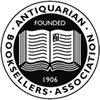
MAPS & VIEWS
PRINTS
BOOKS
back to search results place the mouse over an image to zoom
Scapula Lexicon.
Scapulæ, Joannis. Lexicon GræcoLatinum Novum. Lexicon Græco-Latinum novum : in quo ex primitivorum & simplicium fontibus derivata atque composita (ordine non minùs naturali, quàm alphabetico,) breviter & dilucidè deducuntur. Cui appendix est exactissimus Græci idiomatis index oper & studio Ioannis Scapulæ. Ad hæc, auctarium extat dialectorum omnium à Iacobo Zvingero Phil. & Med. Basil. in expeditas succinctâsque tabulas compendiosè redactarum. Editio novissima, prioribus omnibus quibuscun[que] auctior, annexo copiosissimo Latino indice Laurentij Martij Palatini ... Huc accessit etiam lexicon etymologicum linguæ Græcæ ... Autore, Ioanne Harmaro ex celeberrima Academia Oxoniensi Londini London Typis T(homæ )H(arperi), T(homas )C(otes), and A(nne )G(riffin,) impensis Iocosæ Norton. & Richardi Whitakeri. Prostant ad Insignia Regia, in Cœmeterio D. Pauli, st. 1637.Folio; 4 parts in 1:[12] p., 1856 columns, [187] p., 7-190 columns, [241] p.; [4] p., 64 columns;
Title page in red and black; the roman numeral date is made with turned C's. titles to each part with colophons.
Index Latinus (unpaginated, , ²A-²V) has separate dated title page with excudebat Tho. Cotes in imprint. Lexicon etymologicum linguae Graecae has separate register and dated title page with typis Annae Griffin in imprint.
Cotes and Griffin also pr[inted]. sections of pt.1
The colophon to Appendixis dated 1636 Apud Richardum Whittakerum
Later [19th century?] diced calf ; six raised bands gilt; marbled end papers,
The volume includes
Part!:Lexicon Græco-Latinum novum in 1856 columns, plus index;
Part 2 : Iacobi Zvingeri ... Græcarum dialectorum Hypotyposis& Apendixeorum Quae Insipso Lexico Commode;
Part 3: Index Latinos in Iohannis Scapulæ Lexicon Græco latinum.... Laurenti Martii Palatini;
Part 4:Lexicon Etymologicum Linguæ Græcæ ... Ioanne Harmaro
Joints with light rubbing; spotting to blank side of end papers; internally generally clean and crisp. rear inner joint starting.
Part 2; Appendix: ß1 & ß2 stuck together at inner gutter; ß5page loose, never stitched in.
Part 3 Index Latinus: tear to margin of G4 just touching textwith loss to blank margin but not text.
Scapula, John, the reputed author of a Greek Lexicon, [..] has his name recorded in the annals of literature, neither on account of his talents and learning, nor for his virtuous industry, but for a gross act of disingenuity and fraud which he committed against an eminent literary character of the sixteenth century. Being employed by Henry Stephen's,[Henri Estienne] the celebrated printer, as a corrector to his press, while he was publishing his "Thesaurus Linguæ Græcæ," Scapula extracted those words and explications which he reckoned most useful, comprised them in one volume, and published them as an original work, with his own name. The compilation and printing of the Thesaurus had cost Stephen's immense labour and expense; but it was so much admired by the learned men to whom he had shown it, and seemed to be of such essential importance to the acquisition of the Greek language, that he reasonably hoped his labour would be crowned with honour, and that the money he had expended would be repaid by a rapid and extensive sale. Before, however, his work came abroad, Scapula's abridgment appeared; which, from its size, price, and obvious utility, was quickly purchased, while the Thesaurus itself lay neglected in the author's hands. The consequence was a bankruptcy on the part of Stephen's, while he who had occasioned it was enjoying the fruits of his treachery. Scapula's Lexicon was first published in 15--, in 4to. It was afterward enlarged, and published in folio.[...] Stephen's charges the author with omitting a great many important articles, and with misunderstanding and perverting his meaning, and tracing out absurd and trifling etymologies, which he himself had been careful to avoid. Dr. Busby, so much celebrated for his knowledge of the Greek language, and his success in teaching it, would never permit his scholars in Westminster-school to make use of Scapula.[1 Clark's Bibliog. Dict. vol. IV.*-Balllet Jugemens.Morhoff Poly hist.]
Whether it is true that Scapula plagiarized Estienne's great work as the latter claimed cannot be proved, as Craik mentions the Lexicon in fact appeared in 1579, some years after Estienne's great scholarly work published in 1572, nevertheless it undoubtedly had an impact on the sales of the earlier work, and could have helped in the demise of Estienne's business.
Craik does not condemn the author as had those in the past and considers the work as a performance of considerable ability.[.....] it has ever since its appearance ranked as one of the most valuable auxileries to which recourse can be had in the study of Greek and has without doubt contributed essentially to the diffusion of a knowledge of that language - a circumstance which makes one learned writer observe that scapula has done as least as much service to scholars in general as he did injury to his master.(see The Pursuit of Knowledge Under Difficulties, Volume 8 page 161-3By George Lillie Craik).
1 Clark's Bibliog. Dict. vol. IV.*-Balllet Jugemens.Morhoff Poly hist.;George Lillie Craik.The Pursuit of Knowledge Under Difficulties, Volume 8 page 161-3. 350 by 235mm (13¾ by 9¼ inches). ref: 3064 €850
Company: Bryan, Mary Louise.
Address: Ag. Andrianoy 92 , 21 100 Nafplio, Greece.
Vat No: EL 119092581











